Related Research Articles

The Orange Free State was an independent Boer sovereign republic under British suzerainty in Southern Africa during the second half of the 19th century, which ceased to exist after it was defeated and surrendered to the British Empire at the end of the Second Boer War in 1902. It is one of the three historical precursors to the present-day Free State province.

Prince of Orange is a title originally associated with the sovereign Principality of Orange, in what is now southern France and subsequently held by sovereigns in the Netherlands.
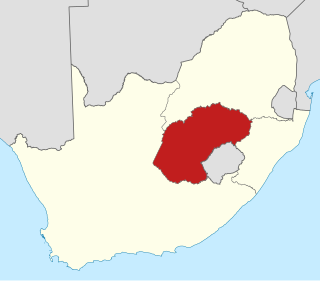
The Province of the Orange Free State, commonly referred to as the Orange Free State, Free State or by its abbreviation OFS, was one of the four provinces of South Africa from 1910 to 1994. After 27 April 1994 it was dissolved following the first non-racial election in South Africa.
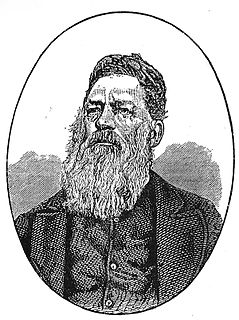
Josias Philip Hoffman was a South African Boer statesman, and was the chairman of the Provisional Government and later the first State President of the Orange Free State, in office from 1854 to 1855.
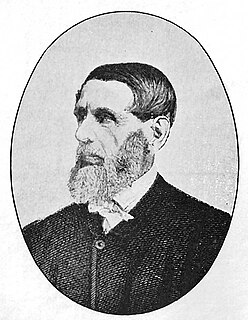
Jacobus Nicolaas Boshof was a South African (Boer) statesman, a late-arriving member of the Voortrekker movement, and the second state president of the Orange Free State, in office from 1855 to 1859.

The Reverend Stephanus Jacobus du ToitAfrikaans pronunciation: [steˈfɑːnɵs jaˈkʊɵ̯bɵs dyˈtwa] was a controversial South African nationalist, theologian, journalist and failed politician. In his younger years Du Toit did much to promote the Afrikaans language as a symbol of Afrikaner nationalism. Apart from the years 1882-8 when he was Superintendent of Education in the South African Republic, he lived in or near the town of Paarl in the Cape Colony. Disillusionment with the Kruger regime led him, in later years, to moderate his views. He was instrumental in initiating the translation of the Bible into Afrikaans and was a proponent of the Afrikaans language. He died an outcast.

The General Dan Pienaar Artillery Regiment is a reserve artillery regiment of the South African Army.

Hendrik Pieter Nicolaas Muller was a Dutch entrepreneur, diplomat, and publicist who started his career as a businessman, trading with East and West Africa. In his mid-twenties he travelled to Zanzibar, Mozambique, and South Africa for business purposes, but showed himself a keen ethnographer as well.
Jacobus Groenendaal was a South African statesman of Dutch origin, member of the Volksraad of the Orange Free State and the republic's first Treasurer General and Government Secretary in office from 1854 to 1855 and 1856 respectively.
Oloff Johannes Truter was a South African civil servant in the Orange Free State, miner, Landdrost and Acting Government Secretary.
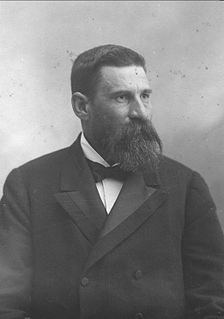
Sir Cornelius Hermanus Wessels was a South African statesman.
Jan Willem Spruyt, also known as Jan Willem Spruijt and Jan Willem Landskroon Spruijt (birthname), was a South African civil servant, lawyer and statesman of Dutch descent. Spruyt was government secretary (1856–1862) and several times acting state president of the Orange Free State, and state secretary of the South African Republic (1866–1869).
Johan Arnold Smellekamp was a Dutchman who pioneered trade with the Boer Voortrekker states in South Africa and later became a civil servant, politician and law agent in the Orange Free State.
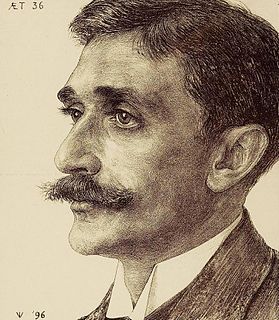
Willem Johannes Leyds was a Dutch lawyer and statesman who served as state attorney and state secretary of the South African Republic. From 1898 to 1902, during the crucial period of the Second Boer War, he was the Republic's special envoy and minister plenipotentiary in Brussels, accredited to several European states.
Cornelis Hiddingh, RNL was a South African born Dutch lawyer and civil servant, who acted as special envoy to the Orange Free State and South African Republic in 1855–1856 and was consul general of the Orange Free State in the Netherlands between 1861 and 1871.
Ulrich Gerard Lauts, originally a merchant, later a teacher and professor of Dutch language and literature at the Museum for Science and Arts in Brussels and later at the Royal Naval Institute in Medemblik. Lauts was an early protagonist of the cause of the South African Voortrekkers and Dutch migration to the new Boer republics.
Freemasonry was brought to South Africa by members of the Grand Orient of the Netherlands in 1772. Today there are lodges chartered under the United Grand Lodge of England, the Grand Lodge of Scotland, the Grand Lodge of Ireland, as well as the Grand Lodge of South Africa.

Jacob Leonard de Bruyn Kops, was a Dutch liberal economist, politician, and professor in political economy and administrative law at the Delft University of Technology.
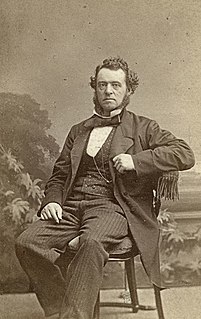
Hendrik Muller Szn. was a Dutch merchant and politician. He is the father of Hendrik Pieter Nicolaas Muller.
References
- Spies, F.J. du Toit (1941). Hamelberg en die Oranje Vrijstaat. Amsterdam: Swets & Zeitlinger (Ph.D. dissertation Leiden).
- Spies, F.J. du Toit (1946). 'n Nederlander in diens van die Oranje-Vrystaat. Uit die nagelate papiere van Dr. Hendrik P.N. Muller, oud-konsul-generaal van die Oranje-Vrystaat. Amsterdam: Swets & Zeitlinger.